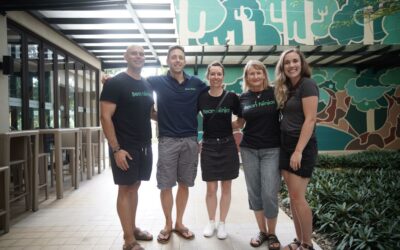Want to build a highly productive remote team?
In this guest article Anna Usova from Running Remote shares three themes to develop a strong foundation of a productive remote team.
Running Remote are also hosting a free online charity event Remote AID 2020 on April 20. Join the online event for remote-first companies and remote employees to make the transition to remote smoother for your business.
Satisfying work helps drive our need to be fulfilled. Like a palm tree with deep roots near a sandy beach that survives the brunt of storms year after year, you can nurture your employees to build a resilient and productive remote team. And in doing so, you can continue to see gains for free.
Build trust with the gift of autonomy

When you have autonomy, you have a say in how you operate. Embracing remote work opens up a path to more freedom. A team member that works remotely from home can have different dimensions of autonomy. For instance, they may have a choice in how they go about getting their job done or have feedback on projects and activities that are assigned.
In Daniel Pink’s book Drive, he argues that a sense of autonomy can boost individual performance and attitude. These gains also carry over into the workplace.
A 2004 study, at Fordham University, for example, compared workers at an investment bank in the United States. The researchers, Edward Deci, Richard Ryan, and Paul Baard, discovered higher job satisfaction between employees whose bosses offered “autonomy support.” These bosses saw issues from the employee’s point of view, gave meaningful feedback and information, provided ample choice over what to do and how to do it, and encouraged employees to take on new projects.
The lift in job satisfaction led to higher performance on the job.
What this study is suggesting, in other words, is that supporting employees with autonomy is an investment that keeps growing and paying dividends in the long term. The sense of freedom can be empowering, which helps a remote team member understand that their work matters. You can also help your employees focus on what is essential.
Here’s a video of Daniel Pink talking about intrinsic motivators:
Related: Scaling Your Business: The Secret to Building High Performing Teams with Barbara Turley
Prioritize the value of impact over busyness
Have you ever had a day where you seemed really busy, yet you felt like you didn’t get much accomplished?
It happens to the best of us. However, if you find this becoming a regular thing, then it’s time to make some changes by doing an express audit of your priorities. This audit takes just a few minutes.
1) Open up a couple of the tools that you use to track progress on your work (e.g., a project management app, your calendar).
2) Take a look at what you’ve accomplished within the last week.
3) Ask yourself: “Am I spending most of my time working on tasks and projects that support the goals of my team?”
If the answer is a confident yes, then continue on your course.
If you hesitate or you are not sure, then get some clarity. First, ask for feedback to make sure you understand the goals of your team. Then realign a couple of your priorities, so you begin to focus on more meaningful work. Notice that this is a transition instead of an overnight switch. You are dialing back on specific tasks that free up time that can be used for other activities that support your impact as a remote professional.
As author Daniel Gilbert writes in his book, Stumbling on Happiness, “Impact is rewarding. Mattering makes us happy. The act of steering one’s boat down the river of time is a source of pleasure, regardless of one’s port of call.”
A couple of years ago, I read about a technique to help with follow-through. It was easy to do, so it became a daily habit for me. Here is how it works.
At the end of my day, I ask myself this question:
What are the 2 to 3 things that I want to get done tomorrow?
I write them down as I wrap my day. Then the next morning, I know my most important tasks for the day. To maximize my impact, I get specific on the tasks that I want to do, so they are focused on a result or outcome.
Here are a few examples of tasks to help spark your creativity:
– Remote developer: I’ll respond to 3 code reviews.
– Remote sales: I’ll send follow up emails to 25 customers.
– Remote support: I’ll outline a new help document for our product’s latest feature.
Some of these may not be directly related to your work. Rather than dismiss them — think about what you can learn from these and apply to something that you do work on.
This approach is also flexible in that tasks can change throughout the week, so the effort is applied towards various projects. It can also be freeing because instead of an endless to-do list, you know exactly what to do each day. On most days, I accomplish those tasks, and I’m pleased. If not, I don’t feel guilty nor beat myself up — instead, I know I continue the next day and keep going. In doing this activity, you may discover some patterns and insights, and that is what we’ll talk about next.
Related: 5 Key Areas to Consider When Building a Remote Company
Encourage more of what is working
One of the benefits of a distributed team is that each team member has their experiences and ideas. These unique perspectives contribute to the collective mind of the group, and they are a way to continue making progress over time. But first, you have to be able to spot them.
In the book, Switch, the author’s Dan Heath and Chip Heath discuss the idea of bright spots. You can start your search for bright spots by asking, “What’s working, and how can we do more of it?”
Let’s say you are leading a team of five developers in a software company. Part of writing code involves getting a code review for quality assurance. In a code review, another developer takes a look at the new code written by a colleague and offers feedback. The feedback helps make sure the code will do what it is intended to do and offers suggestions to improve it. To keep a project moving along and on schedule, code reviews need to be timely. You notice that three developers regularly run into challenges with responding to code reviews, which causes unexpected setbacks. You also see that two developers have a quick turnaround time for their code reviews.
At first glance, you may dive into problem-solving mode and focus on the three underperforming developers. Asking questions and giving meaningful feedback is good.
However, you should focus most of your energy and effort on the two developers that are staying on top of their code reviews. In your search for finding a bright spot, you reach out to them to hear more about how they approach code reviews. Perhaps you learn that they both start their day by responding to code reviews. Now, you’ve got valuable feedback that you can share with the rest of your development team.
Remember that finding bright spots starts with asking, “what’s working, and how can we do more of it?”
What bright spots can you help your remote team discover this week?
Next steps for building a productive remote team
As a leader, you can help your team feel happy and satisfied through fulfilling work. Three keys to keep in mind are:
1) Build trust with the gift of autonomy,
2) Prioritize the value of impact over busyness, and
3) Encourage more of what is working.
Want more support to build a resilient and high-performing remote team? Sign up for Remote AID 2020.
Remote AID 2020 is a free online event for remote-first companies and remote employees. In this one-day event, you’ll learn from leaders in remote work. Guests include David Heinemeier Hansson (co-founder & CTO of Basecamp), Lori McLeese (Global Head of HR at Automattic), Steli Efti (CEO and Co-founder of Close), and Taso Du Val (CEO of Toptal). All proceeds from voluntary donations will be sent to the Red Cross.





